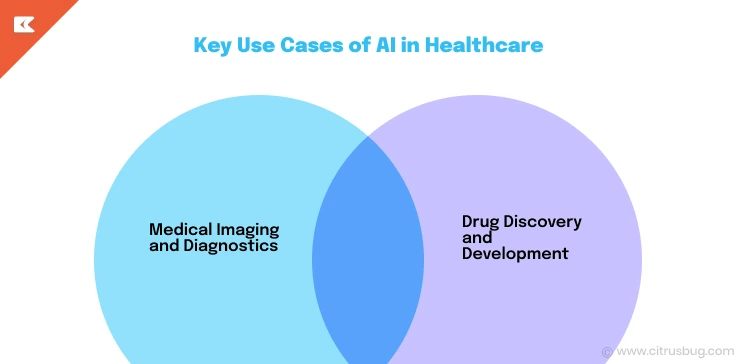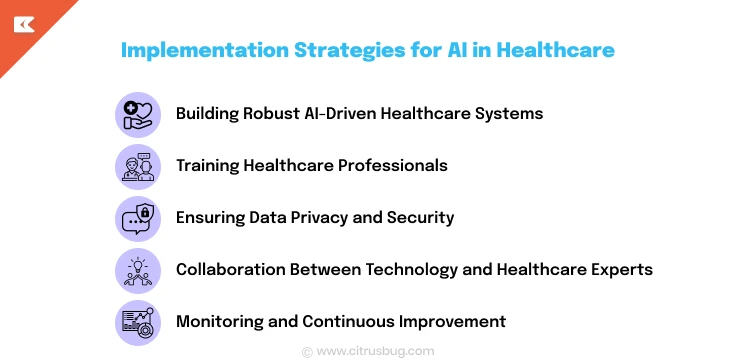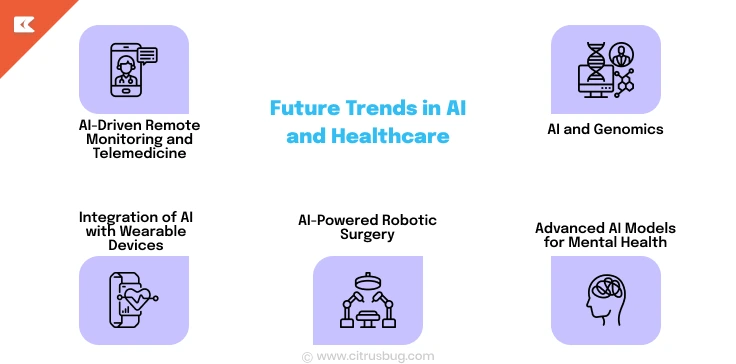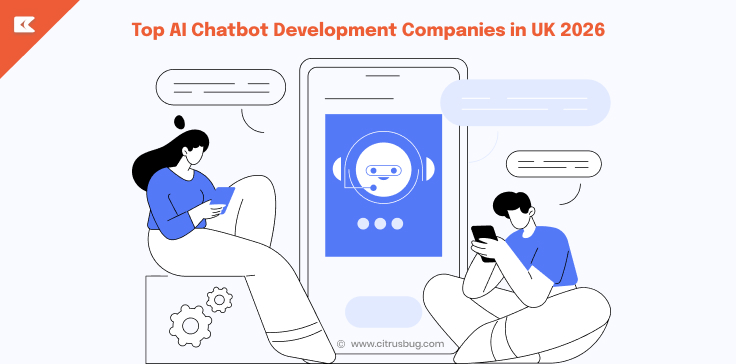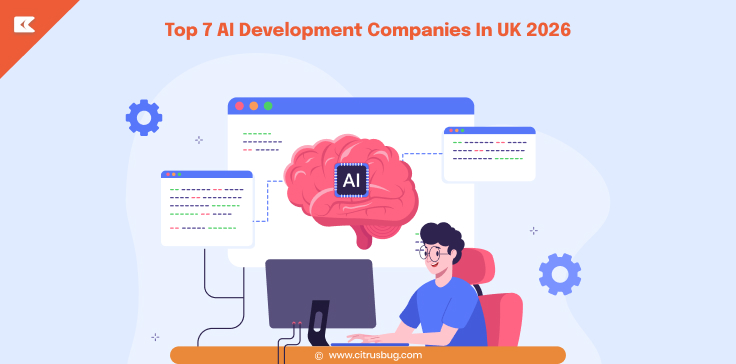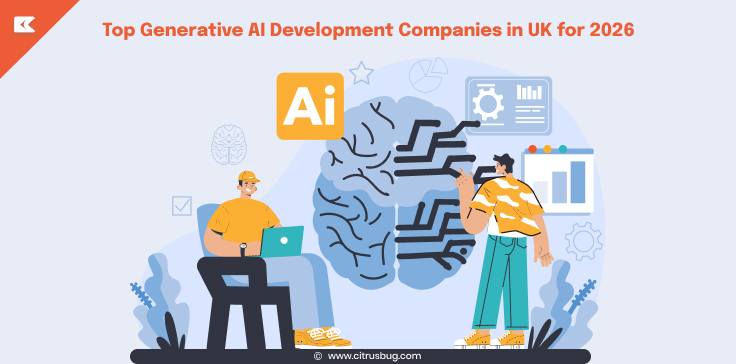Use Cases of AI in Healthcare: Implementation Strategies and Future Trends
- November 7, 2024
-
4170 Views
- by Ishan Vyas
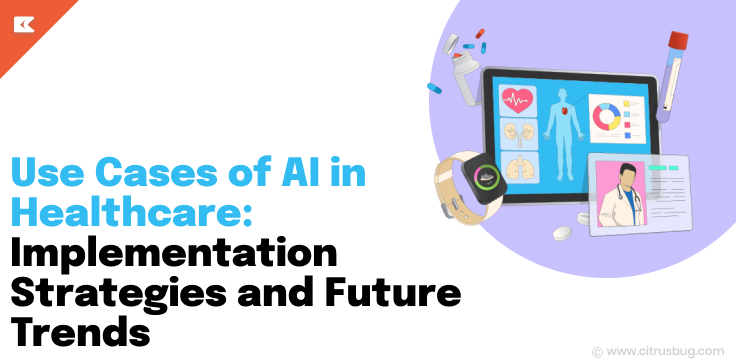
The rapid development of AI impacts many sectors, and healthcare is probably one of the most heavily affected sectors. AI has the full potential to transform healthcare systems, improve patient outcomes, and ensure that providers have more efficient workflows. All use cases of AI include everything from diagnosis and treatment planning to personal medicine. It must be remembered that the healthcare industry has already integrated AI; thus, such development would only come in handy if healthcare professionals and technology developers were aware of these use cases, implementation strategies, and future trends.
Introduction to AI in Healthcare
Apart from assisting doctors in diagnosing patients, healthcare has brought AI outside research and development to optimize administrative processes, advance drug development, improve image-based medical scanning, and even customize approaches to treatment based on individual data. AI is exceptionally powerful at analyzing vast datasets, detecting hidden patterns, and providing actionable insights that human practitioners often miss.
The need for AI technologies and systems has been recognized in the healthcare sector, as custom medical software development nowadays incorporates AI into the platform. Innovative solutions provided by AI deal with long-standing problems such as inefficiency, variability, and high costs in the care of patients.
Key Use Cases of AI in Healthcare
Medical Imaging and Diagnostics
The most visible application of AI in health is in medical imaging and diagnostics. Now, with AI, one can scan images like X-rays, MRIs, CT scans, and any other representative human body images for some kind of anomaly like tumors or fractures with comparatively high accuracy. This works well because algorithms like CNNs assist radiologists in reaching a diagnosis faster and more accurately.
For instance, AI systems are excellent in the early detection of cancer that probably no human eye can detect. AI algorithms are remarkably accurate in the detection of diseases like lung cancer, surpassing conventional practices.
Example: Google’s DeepMind has unveiled that it has developed computers with artificial intelligence that can identify more than 50 types of eye diseases based on OCT scans with almost human-like accuracy.
Drug Discovery and Development
AI has transformed the Pharmaceutical landscape from breaking barriers to accelerating drug discovery and development. That old-fashioned drug discovery approach takes years and costs millions of dollars, but with AI, all this gets done within a much smaller time frame and reduces the resources required; all this is done by identifying the potential drug candidates.
Example: IBM Watson has also been employed in drug discovery in as much as it can analyze gigantic datasets and suggest possible treatments, saving ample time and money.
Personalized Medicine
The other primary application of AI in healthcare is personalized or precision medicine. AI can consider genetic, lifestyle, and environmental data to develop customized treatment plans specific to a patient’s needs. This has proved extremely useful in oncology as AI-driven models can analyze how a patient will respond to specific treatment options so that the doctor can make wiser choices.
With genomics data combined with AI, healthcare providers will be able to prescribe treatments that would have the maximum effect while minimizing the chance of triggering adverse effects. Thus, this advancement also leads to the development of applications like healthcare SaaS, which may carry in real-time the analysis of patient data to provide doctors with actionable insights toward better patient care.
Virtual Health Assistants and Chatbots
AI-powered virtual health assistants and chatbots have indeed transformed patient engagement with a 24/7 support system, fast answers to any medical-related questions, and guiding a patient through treatment protocols. These AI healthcare tools track a patient’s symptoms, remind them when to take their medicine, and can even schedule an appointment for the patient with the health provider.
These virtual assistants employ natural language processing (NLP) to understand patient queries and provide correct information. These not only relieve healthcare professionals of part of their workload but also ensure that patients receive proper and timely information.
Example: Ada is a health app powered by an AI device that aims to enable patients to understand their symptoms and provide possible causes based on an extensive medical knowledge base.
Predictive Analytics for Preventive Healthcare
AI would truly prove to be revolutionary in preventive care. AI can make predictions of the development of a disease or health condition based on historical data. Healthcare providers can then determine who is at risk and create a customized preventive care plan to ensure a much better health outcome in the long run.
For example, AI algorithms can scan data from wearables and EHRs to monitor heart health in real-time and pattern out where an increased risk of cardiovascular diseases may be identified.
Example: By using AI models, the probability that a patient might develop certain conditions like diabetes can be predicted, and this gives doctors a chance to intervene early with either recommendations on lifestyle or treatments.
Implementation Strategies for AI in Healthcare
Indeed, the successful integration of AI in health care is dependent on thoughtful planning, close cooperation among healthcare providers and technologists, and appropriate technological infrastructure. And here’s how to key implement such strategies:
Building Robust AI-Driven Healthcare Systems
Healthcare providers must invest in healthcare IT consulting services that leverage AI technologies to streamline workflows and enhance patient outcomes. Development of high-quality systems that can deal with handling large data sets, integrated, and giving real-time inputs are some of the essentials in having successful implementation.
These systems also need to have user-friendly interfaces to support healthcare professionals in easy access to and interpretation of AI-derived insights. Collaboration with experienced developers and AI specialists will enable the creation of scalable and secure platforms that can be adapted to changes in AI technology.
Training Healthcare Professionals
Proper deployment of AI in healthcare cannot be executed without training health professionals who are to work together with such applications. Physicians, nurses, and administrative staff need to become acquainted with how the AI system operates and what to look for in its output.
This requires investments in education and training programs focused on the practical applications of AI in clinical settings. The better healthcare professionals understand AI, the better they are able to use it to improve patient care and outcomes.
Ensuring Data Privacy and Security
Since AI is very data-intensive, in the healthcare sector, protection of sensitive information about patients is paramount. Strategies on implementing AI models must focus on data privacy and security. Therefore, protecting patient data through anonymization and secure data-sharing protocols are crucial for making it possible for AI models to intelligently process it.
Collaboration Between Technology and Healthcare Experts
The implementation of AI in healthcare doesn’t end with choosing the correct technology; it is equally important to collaborate with healthcare providers, data scientists, and AI specialists. True success would involve multidisciplinary teams with medical expertise accompanying them with technical and data science knowledge to be able to create solutions addressing real-world healthcare challenges.
Monitoring and Continuous Improvement
Once developed, these AI systems will need continuous monitoring and improvement based on the feedback available in real-time. Medical knowledge would be considered and, through regular updates, flowed through to the AI models, ensuring continuation without loss of accuracy and reliability. Monitoring can also catch biases in the AI models that may imply a negative effect on patient care.
Future Trends in AI and Healthcare
As AI continues to evolve, new trends will emerge, shaping the future of healthcare delivery. Here are some key trends to watch:
AI-Driven Remote Monitoring and Telemedicine
Telemedicine is an area that COVID-19 has seen rapid growth and adoption in. With more support of AI, more improvements are being done concerning the provision of remote care. They are AI-driven remote monitoring tools that track the real-time health metrics of patients and alert the health professionals in case of the need for intervention to be taken.
AI-powered telemedicine app development services have made it easier for doctors to meet with patients virtually. In this scenario, there will be actual or real time patient data with analysis.
Integration of AI with Wearable Devices
This makes the wearable health device increasingly sophisticated, where AI would amplify all these devices’ capabilities of data tracking. In the future, AI will fully enable wearables in monitoring not only basic health metrics but also predictive analytics in preventive healthcare. Advanced monitoring capabilities in these wearables will help its users track continuously the vital signs of the user, detect early symptoms, and recommend preventive actions before more significant health problems develop.
AI-Powered Robotic Surgery
Robotic surgery is already a reality; however, with AI added to this technology, it will be more accurate and efficient in the short term. The AI algorithms will help doctors analyze real-time data, suggest effective techniques, and even automate portions of the procedure. This could minimize or eliminate errors and promote better patient outcomes.
Advanced AI Models for Mental Health
Early detection and intervention of mental health conditions with the help of available tools improves mental health care because more mental health platforms operate through AI. This means AI can evaluate speech patterns, social media activity, and other data points to detect signs that one may have a mental health condition like depression or anxiety early on. Therefore, in the future, AI models built by mental health tech companies will also become more effective in preparing and individually prescribing mental health treatment plans and helping therapists deliver better care.
AI and Genomics
AI is sure to come into vital play in genomics unlocking fully, for the first time, the treasure trove of genetic data toward the delivery of personalized medicine by healthcare providers. In analyzing vast amounts of genomic data, AI will figure out which markers are relevant to various diseases, thus enabling doctors to diagnose their patients at an earlier stage and develop more targeted strategies for treatment.
Conclusion
The use cases of AI are enormous and are indeed showing signs in the health sector. From better diagnostics and personalized treatment plans to optimizations of administrative processes, enhanced drug development, and much more, AI is driving the next wave of healthcare innovation.
This will be an era of continuous advancement for AI technologies, and the AI software development solutions are going to provide key input for healthcare systems in adapting to these new interfaces. Health care providers will ensure that the respective systems function without glitches and would maximize patient outcomes with the assistance of these AI-based tools becoming integrated into existing infrastructures. The future of healthcare lies in intelligent data-driven solutions, and for healthcare organizations to stay in the competition arena, they have to embrace AI, invest in the right AI software development agency, and remain ahead of the emerging trend.





 SaaS Development
SaaS Development Web Application Development
Web Application Development Mobile Application Development
Mobile Application Development Custom Software Development
Custom Software Development Cloud Development
Cloud Development DevOps Development
DevOps Development MVP Development
MVP Development Digital Product Development
Digital Product Development Hire Chatbot Developers
Hire Chatbot Developers Hire Python Developers
Hire Python Developers Hire Django Developers
Hire Django Developers Hire ReactJS Developers
Hire ReactJS Developers Hire AngularJS Developers
Hire AngularJS Developers Hire VueJS Developers
Hire VueJS Developers Hire Full Stack Developers
Hire Full Stack Developers Hire Back End Developers
Hire Back End Developers Hire Front End Developers
Hire Front End Developers AI Healthcare Software Development & Consulting
AI Healthcare Software Development & Consulting Healthcare App Development
Healthcare App Development EHR Software Development
EHR Software Development Healthcare AI Chatbot Development
Healthcare AI Chatbot Development Telemedicine App Development Company
Telemedicine App Development Company Medical Billing Software Development
Medical Billing Software Development Fitness App Development
Fitness App Development RPM Software Development
RPM Software Development Medicine Delivery App Development
Medicine Delivery App Development Medical Device Software Development
Medical Device Software Development Patient Engagement Software Solutions
Patient Engagement Software Solutions Mental Health App Development
Mental Health App Development Healthcare IT Consulting
Healthcare IT Consulting Healthcare CRM Software Development
Healthcare CRM Software Development Healthcare IT Managed Services
Healthcare IT Managed Services Healthcare Software Testing services
Healthcare Software Testing services Medical Practice Management Software
Medical Practice Management Software Outsourcing Healthcare IT Services
Outsourcing Healthcare IT Services IoT Solutions for Healthcare
IoT Solutions for Healthcare Medical Image Analysis Software Development Services
Medical Image Analysis Software Development Services Lending Software Development Services
Lending Software Development Services Payment Gateway Software Development
Payment Gateway Software Development Accounting Software Development
Accounting Software Development AI-Driven Banking App Development
AI-Driven Banking App Development Insurance Software Development
Insurance Software Development Finance Software Development
Finance Software Development Loan Management Software Development
Loan Management Software Development Decentralized Finance Development Services
Decentralized Finance Development Services eWallet App Development
eWallet App Development Payment App Development
Payment App Development Money Transfer App Development
Money Transfer App Development Mortgage Software Development
Mortgage Software Development Insurance Fraud Detection Software Development
Insurance Fraud Detection Software Development Wealth Management Software Development
Wealth Management Software Development Cryptocurrency Exchange Platform Development
Cryptocurrency Exchange Platform Development Neobank App Development
Neobank App Development Stock Trading App Development
Stock Trading App Development AML software Development
AML software Development Web3 Wallet Development
Web3 Wallet Development Robo-Advisor App Development
Robo-Advisor App Development Supply Chain Management Software Development
Supply Chain Management Software Development Fleet Management Software Development
Fleet Management Software Development Warehouse Management Software Development
Warehouse Management Software Development LMS Development
LMS Development Education App Development
Education App Development Inventory Management Software Development
Inventory Management Software Development Property Management Software Development
Property Management Software Development Real Estate CRM Software Development
Real Estate CRM Software Development Real Estate Document Management Software
Real Estate Document Management Software Construction App Development
Construction App Development Construction ERP Software Development
Construction ERP Software Development





